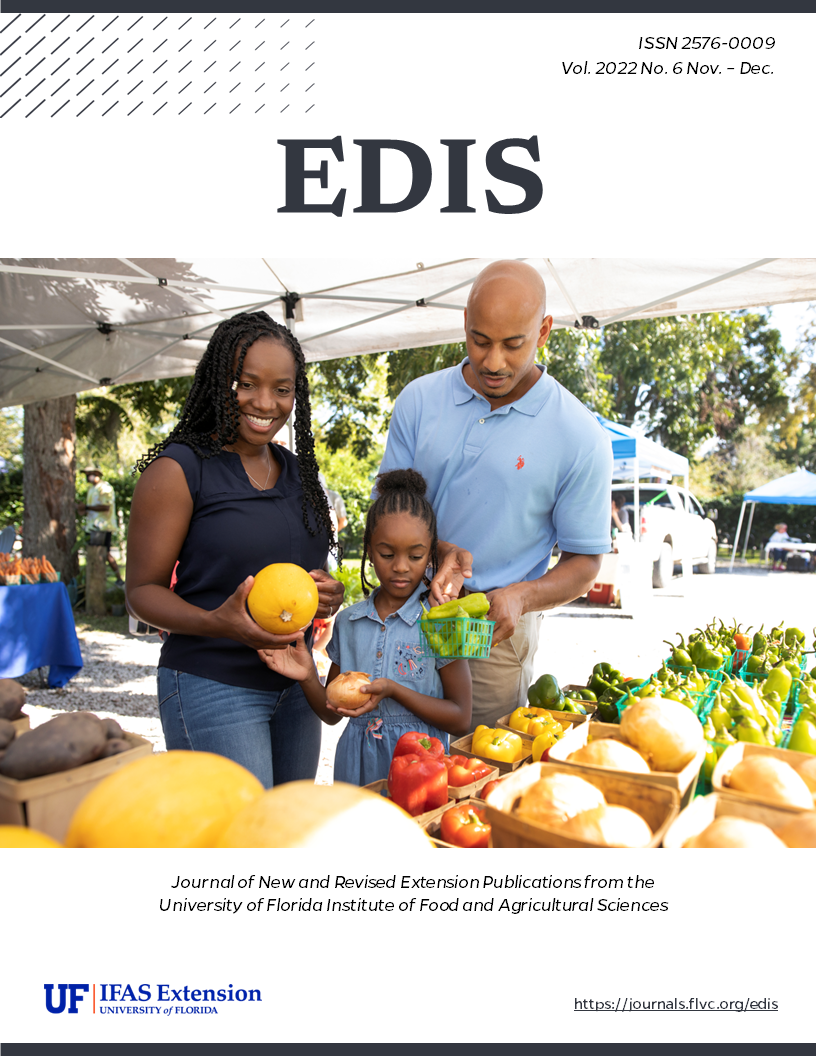Resumen
Strawberry seed bug, Neopamera bilobata (Say), is a pest of organic strawberries in Florida. The rhyparochromidae species has been collected in a range of habitats worldwide, including South and Central America and many states in the southeastern United States. Strawberry seed bugs can cause injury to ripe strawberries, decreasing growers’ profits. Integrated pest management techniques can mitigate strawberry seed bug populations in organic systems. This publication provides an overview of the strawberry seed bug and the injuries it can cause to strawberries produced in Florida. It includes monitoring and management options growers can use against strawberry seed bugs in organic strawberry production.
Citas
Bielinski M. S., K. C. Craig, R. S. Maricruz, and P. S. Teresa. 2009. “Evaluation of Strawberry Cultivars in Florida” International Journal of Fruit Science 9: 419–424. https://doi.org/10.1080/15538360903378765
Botton, M., T. M. Kuhn, M. A. C. Zawadneak, and A. E Loeck. 2016. “Bioecology and Characterization of Neopamera bilobata (Say, 1832) (Hemiptera: Rhyparochromidae) Damage in Strawberry.” Brazilian Agricultural Research Corporation Embrapa Clima Temperado, Brasilia, Brazil. 194:10.
Brambila, J., and G. S. Hodges. 2008. “Bugs (Hemiptera).” In Encyclopedia of Entomology edited by J. L. Capinera. Springer: Dordrecht, The Netherlands; Volume 2, pp. 591–611.
Cuda, J. P., J. C. Dunford, and J. M. Leavengood Jr. 2007. “Invertebrate Fauna Associated with Torpedograss, Panicum repens (Cyperales: Poaceae), in Lake Okeechobee, Florida, and Prospects for Biological Control.” Florida Entomologist 90:238–248. https://doi.org/10.1653/0015-4040(2007)90[238:IFAWTP]2.0.CO;2
Dellape, P. M. 2005. “Biodiversity, Phylogenetic Relationships and Biogeographic Aspects of Rhyparochromidae (Lygaeoidea: Heteroptera) COM Special Reference to Genus Neopamera Harrington 1980.” – Faculty of Natural Sciences and Museum, National University of La Prata, La Plata, Argentina. 249pp.
Domoto, P. A., M. Gleason, and D. Lewis. 2008. “Production Guide for Commercial Strawberries.” Iowa State University Extension and Outreach. PM 672D.
Ernest, E. G., and G. Johnson. 2020. “Misshapen Strawberry Fruits, Cold Damage and Frost Injury.” Weekly Crop Update. UD Cooperative Extension, Newark, Delaware. https://sites.udel.edu/weeklycropupdate/?p=14676
Hata, F. T., M. U. Ventura, V. L. Béga, I. M. Camacho, and M. De Paula. 2018. “Chinese Chives and Garlic in Intercropping in Strawberry High Tunnels for Neopamera bilobata Say (Hemiptera: Rhyparochromidae) Control.” Bulletin of Entomological Research 1–7. https://doi.org/10.1017/S0007485318000299
Hughes, B. R., J. Zandstra, T. Taghavi. and A. Dale. 2017. “Effects of Runner Removal on Productivity and Plant Growth of Two Day-Neutral Strawberry Cultivars in Ontario, Canada.” Acta Horticulturae 1156:327–332. https://doi.org/10.17660/ActaHortic.2017.1156.50
Kuhn, T. M. 2014. “Bioecology, Characterization of Injuries and Effect of Insecticides on Neopamera sp. aff. Bilobata (Say, 1832) (Hemiptera: Rhyparochromidae) in Strawberry.” Dissertation (Master's degree in science) – Faculty of Agronomy, Elisha Maciel, Federal University of Pelotas, Pelotas, Brazil. 66pp. https://doi.org/10.1590/S0100-204X2014000600003
Kuhn, T. M. A., A. E. Loeck, M. A. C. Zawadneak, M. S. Garcia, and M. Botton. 2014. “Parâmetros biológicos e tabela de vida de fertilidade de Neopamera bilobata (Hemiptera:Rhyparochromidae) em morangueiro.” Pesquisa Agropecuária Brasileira 49:422–427.
Schuh, R. T and J. A. Slater. 1995. The True Bugs of the World (Hemiptera: Heteroptera). Classification and Natural History. Cornell University Press, Ithaca, New York. 336 pp.
Talton, H. R., E. M. Rhodes, C. A. Chase, M. E. Swisher, J. M. Renkema, and O. E. Liburd. 2020. “Effect of Cultural Practices on Neopamera bilobata in Relation to Fruit Injury and Marketable Yields in Organic Strawberries.” Insects 11:843. https://doi.org/10.3390/insects11120843
Wheeler Jr, A. G., and C.A. Stoops. 2010. “Cnemodus hirtipes Blatchley and C. mavortius (Say) (Hemiptera: Lygaeoidea: Rhyparochromidae) in Fallen Pinecones, with Consideration of the Biological Significance of Cone Occupancy.” Proceedings of the Entomological Society of Washington 112:155–168. https://doi.org/10.4289/0013-8797-112.1.155
Wheeler, A. G. 2016. “Neopamera bilobata (Say) and Ozophora trinotata Barber (Hemiptera: Lygaeoidea: Rhyparochromidae) as Frugivores on Florida Rosemary (Ceratiola ericoides; Ericaceae).” Proceedings of the Entomological Society of Washington 118:424–435. https://doi.org/10.4289/0013-8797.118.3.424
Zalom, F. G., M. P. Bolda, S. K. Dara, and S. Joseph. 2015. “UC IPM Pest Management Guidelines: Strawberry.” UC ANR Publication 3468.

